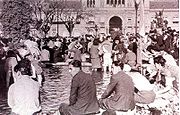
Descamisado
Encyclopedia

Spanish language
Spanish , also known as Castilian , is a Romance language in the Ibero-Romance group that evolved from several languages and dialects in central-northern Iberia around the 9th century and gradually spread with the expansion of the Kingdom of Castile into central and southern Iberia during the...
word that literally means "without shirt" or "shirtless." The term was originally used as an insult by the elite of Argentina
Argentina
Argentina , officially the Argentine Republic , is the second largest country in South America by land area, after Brazil. It is constituted as a federation of 23 provinces and an autonomous city, Buenos Aires...
to describe the followers of Juan Perón
Juan Perón
Juan Domingo Perón was an Argentine military officer, and politician. Perón was three times elected as President of Argentina though he only managed to serve one full term, after serving in several government positions, including the Secretary of Labor and the Vice Presidency...
, who served as president of Argentina
President of Argentina
The President of the Argentine Nation , usually known as the President of Argentina, is the head of state of Argentina. Under the national Constitution, the President is also the chief executive of the federal government and Commander-in-Chief of the armed forces.Through Argentine history, the...
from 1946 until 1955, and then again briefly from 1973 to 1974. The term was later reclaimed as a term of pride, with Juan Perón and his wife Eva Perón
Eva Perón
María Eva Duarte de Perón was the second wife of President Juan Perón and served as the First Lady of Argentina from 1946 until her death in 1952. She is often referred to as simply Eva Perón, or by the affectionate Spanish language diminutive Evita.She was born in the village of Los Toldos in...
affectionately referring to their followers as "descamisados." And during his 1945 campaign for president, Juan Perón toured the country on a train that he named "El Descamisado."
However, the first usage of the term in the history of Argentina dates back to the 19th century. Tomás de Iriarte described in his memories a time when he was walking with Carlos María de Alvear
Carlos María de Alvear
Carlos María de Alvear was an Argentine soldier and statesman, Supreme Director of the United Provinces of the Río de la Plata in 1815....
and found Manuel Dorrego
Manuel Dorrego
Manuel Dorrego was an Argentine statesman and soldier. He was governor of Buenos Aires in 1820, and then again from 1827 to 1828....
with dirty and broken clothes. Iriarte wrote that "Excusado es decir que esto era estudiado para captarse la multitud, los descamisados". (in Spanish, "Needless to say, this was planned to captivate the multitude, the shirtless").
By most accounts, the term has its modern origins on October 17, 1945, when thousands of supporters of Juan Perón gathered in front of the Casa Rosada
Casa Rosada
La Casa Rosada is the official seat of the executive branch of the government of Argentina, and of the offices of the President. The President normally lives at the Quinta de Olivos, a compound in Olivos, Buenos Aires Province. Its characteristic color is pink, and is considered one of the most...
making a demonstration
Loyalty Day (Argentina)
The Loyalty Day is a commemoration day in Argentina. It remembers October 17, 1945, when a massive labour demonstration at the Plaza de Mayo demanded the liberation of Juan Perón, who was jailed in Martín García island...
to demand Perón's release from prison. While waiting for Perón on this hot day, many men in the crowd removed their shirts -- hence the term "shirtless." However, there is much debate among scholars in regards to the origins of the label. Some claim that the moniker was applied in reference to the fact that those labeled as such were in fact the working poor, the social class from which Perón drew the greatest amount of his political backing, who were so downtrodden that they could not have afforded to buy shirts. Perón's use of the labor unions as a means of consolidating his power lends credibility to the claim.
The "descamisados" of Peronism
Peronism
Peronism , or Justicialism , is an Argentine political movement based on the programmes associated with former President Juan Perón and his second wife, Eva Perón...
have occasionally been compared to the Sans-culottes
Sans-culottes
In the French Revolution, the sans-culottes were the radical militants of the lower classes, typically urban laborers. Though ill-clad and ill-equipped, they made up the bulk of the Revolutionary army during the early years of the French Revolutionary Wars...
of the French Revolution
French Revolution
The French Revolution , sometimes distinguished as the 'Great French Revolution' , was a period of radical social and political upheaval in France and Europe. The absolute monarchy that had ruled France for centuries collapsed in three years...
though such a comparison should be made with caution.

